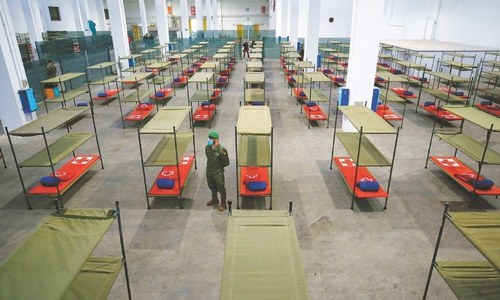In Spain, one of the hardest-hit countries in the pandemic, the coronavirus spread quickly and widely without being detected, especially among the elderly, experts told AFP.
While they stressed it was too early to carry out a detailed analysis, the experts pointed to the country's sociable lifestyle and close ties between young and older family members as significant factors in the virus's spread.
While Spain has the world's highest coronavirus death toll per capita after Belgium, its mortality rate — the percentage of infected patients who die — stands at 10.4 per cent, below other hard-hit nations like Italy, France and Britain.
"The problem here is the size of the pandemic, the great quantity of infections which we had at the peak," said Fernando Rodriguez, a public health professor at Madrid's Autonomous University.
Only the United States has more confirmed Covid-19 cases than Spain, although national variations depend greatly on the number of tests that are carried out.
A study carried out by the Polytechnic University of Catalonia estimated that more than two million of Spain's 47 million people are infected.
Late detection
The virus "circulated under the radar a lot" before the government ordered a near total nationwide lockdown on March 14, said the head of epidemiology at Barcelona's Hospital Clinic, Antoni Trilla.
Unusually warm weather helped spread the virus.
"The weather was fantastic during the last weeks of February and the first week of March and people were out on the streets, very close to one another," said Rodriguez.
This sped up the spread of the virus and "in very little time there was community transmission," he added.
Kisses and hugs
Lifestyle could also have played a role in a country where people spend a lot of time outside in groups eating out, having drinks, attending religious processions, protesting or just going for a walk.
In Spain, as in Italy, "people hug and touch each other a lot, here people are constantly kissing, even at work", said Ildefonso Hernandez, a professor of public health at the Miguel Hernandez University in Alicante.
In addition, Spain has the most people living in flats of any European Union country, according to EU statistics agency Eurostat.
"Our cities are built vertically, there is a lot of density and this can also facilitate the transmission of the virus," Rodriguez said.
Close contact with seniors
While Spaniards have a long average lifespan and the country has a high number of seniors who are more vulnerable to the virus, its share of the population over 65 is lower than other nations that have suffered fewer Covid-19 deaths, such as Germany.
But older people in Spain have more contact with younger family members who can pass on the virus to them, Ildefonso Hernandez said.
"Older people in northern Europe are more secluded and there is more family distance," he said.
In Spain, families "are much tighter, the interaction between youths and seniors is very high," he added.
It is common for several generations to live under the same roof in Spain. The average age a young adult moves out of the home in Spain is 29.5, compared to 18.5 in Sweden and 21.1 in Denmark, according to Eurostat.
Families also frequently visit relatives who live in nursing homes, which became tragic focal points of the pandemic in Spain, Hernandez said.
The Spanish health ministry does not provide figures for the number of deaths from Covid-19 at nursing homes.
But the governments of the two hardest-hit regions, Madrid and Catalonia, reported a combined total of around 8,000 confirmed and suspected deaths from the disease at retirement homes.
Residents of nursing homes are "very old, very fragile", said Trilla.
"They are not healthcare establishments and were not prepared for this. That caused a fire of colossal proportions," he added.
Strained healthcare system
Spain's public healthcare system is ranked in the top 10 in the world by the World Health Organisation (WHO), but it has suffered deep spending cuts since the global financial crisis more than a decade ago.
While it has a strong primary care network, hospitals have fewer beds than the European average, which forced them to improvise during the pandemic.
Like banks with little solvency "they did not pass the stress test", said Guillem Lopez-Casasnovas, an economist and expert on healthcare systems at Barcelona's Pompeu Fabra University who has worked as an advisor to the WHO.
"When you live day to day, you get the most out of what you have, but you don't have enough muscle to respond to a major stressor like now," he added.














































